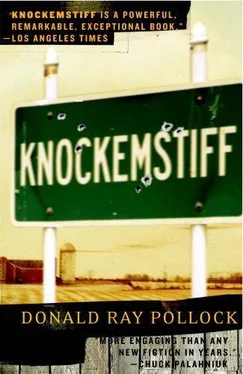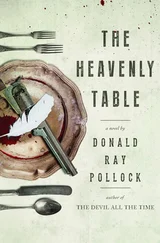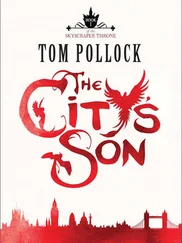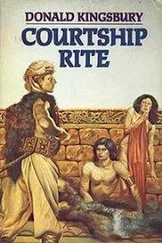When Frankie paused to butter some toast, Todd started talking about his grandmother’s slow death in the back room of the house. Uncle Claude had stopped by every day to see if she was dead yet, kept complaining that the smell was going to keep him from finding a buyer for the place once she was gone. Todd did okay until he tried to describe what it felt like when she took her last, shallow breath. “She was the only mother I ever had,” he tried to say, but the words came out all garbled and snotty. Frankie put down his fork and handed Todd a napkin from the dispenser. Then he stared out the window and picked at his teeth until Todd got up and paid the bill. They slept in the car that night, and early the next morning they bought three bottles of Thunderbird at Gray’s Drugstore. By that afternoon, drunk and half sick, they were looking for a permanent place to stay.
The fish camp they rented was just two moldy rooms and a screened-in porch. They got it cheap from an old widow in town named Fletcher because it had no plumbing or electric. She told them her husband used to take his whores there on the weekends. “I oughta burn the damn place down, but I need the income,” she said when she handed Todd the key. There was a rusted-out coal stove in one corner of the big room that housed black wasps in the summer and leaked black smoke in the winter. Somebody had drawn a life-size stick family on the wall with crayons. All the faded figures had blood pouring from their mouths. Even the dog or cat or whatever it was supposed to be was puking red. Out back was an old well lined with slimy green rocks where they could draw a bucket of water, but it tasted like gasoline. They never drank it, but sometimes Frankie liked to soak his rotten feet in it.
Neither one of them was much for work; so a couple of weeks after they moved in together, they bought a hundred hits of strawberry mescaline for ninety dollars. They ate a few and sold the rest, then bought another batch. Frankie knew lots of people, most of them bad. Todd handled the money and was enterprising in his own small way, but he was also careful. He worked it out so they made just enough to pay the rent, buy some lunch meat and bread, and keep Frankie supplied with cheap wine.
He hid the coffee jar filled with his inheritance behind a rock in the well. His brown hair grew long, and he cut a notch in the doorframe every time he took a trip. He watched the stick family move around on the wall and kill one another over and over. Within a few months he calculated he’d been completely out of his mind more than a hundred times. There were days when he had a hard time remembering his name. Sometimes he worried that he’d forget where he’d hid the coffee jar, and he’d go check on it. Frankie started walking around with a.22 pistol stuck down in his pants. “We gotta protect our empire,” he said whenever Todd complained about the gun.
The fish camp overlooked Schott’s Bridge, the easiest way in or out of the holler. Todd liked to sit on the porch, watch the cars pass over Paint Creek, and listen to the rumble of the tires on the heavy wooden planks. He still daydreamed about leaving. Once in a while, on hot days, they would walk down to the bridge to soak in the shallow riffles and hunt for pop bottles along the road. Invariably, Frankie would try to goad Todd into jumping off the bridge. He’d call him a chickenshit and a coward and then he’d climb up to the top rail and leap off himself. A couple of years ago, a boy from town had dived in headfirst and broke his neck. Todd imagined the snap of that stem every time Frankie hit the water. Once, after mixing beer and whiskey all morning, Frankie pressed his pistol to the back of Todd’s head and ordered him to jump. “Go ahead and shoot, you sonofabitch,” Todd said. “I’d be dead anyway.” He could barely dog paddle, let alone high dive from forty feet. Getting his head blown off didn’t scare him nearly as bad as the deep hole of water on the east side of the bridge. But after a minute or two, Frankie eased the hammer back and stuck the gun down in his pants. As he started to walk away, he said over his shoulder, “You can’t be a pussy all your life, Todd. Someday you’re just gonna have to say fuck it.”
Once a month, Frankie would take off and spend the weekend with an old woman that lived over in Massieville. He’d lost all his confidence around pretty women after his face got mangled, but he told Todd he still needed to get a nut off once in a while. The hag didn’t give a damn what he looked like, as long as he could make his hogleg stand up. On Sunday evenings, he’d come back to the fish camp bruised with denture marks and loaded down with food she’d packed for him: dusty jars of preserves, bread sacks of bloody turtle meat, sometimes a soggy pie. Todd would sniff the food and throw most of it out the door for the raccoons and possums. “I think she’s trying to poison you,” he said one day, peeling back the paper on a package of green hamburger.
“I got to find me something else,” Frankie complained. “My God, she’s awful. I might as well stick my dick in that jar of peaches.”
“The way I figure it, something’s always better than nothing,” Todd said.
“Shit, how would you know?”
“Don’t worry, I know.” Todd went back to rummaging through the sack. He found a slab of macaroni and cheese wrapped up in tinfoil and set it off to the side.
“Well, let me ask you something then,” Frankie said, looking down and picking at a brown scab on his arm. “How did you first figure out you was funny?”
Todd looked up, both surprised and alarmed by the question. “What the fuck’s that mean? Funny. ”
“I mean queer.”
“Why do you want to know?” Todd said.
Frankie gave a little laugh. “Jesus, don’t go getting any ideas. I’m just asking is all.”
Todd thought for a moment. He’d rehearsed the story in his head a thousand times, but nobody had ever asked him anything that personal before. “Remember that VISTA man a few years back?” he said, his voice suddenly shaky. In 1968, when Todd was fourteen, the government had sent a man named Gordon Biddle to Knockemstiff to help the hillbillies build a playground. He told everyone at the first meeting he held at the Shady Glen Church of Christ in Christian Union, “Better to work with the poor in America than fight the poor in Vietnam.” Everyone in the pews, even the old men who had fought in World War Two, grinned and nodded at that, and before the night was over, they had accepted the outsider. For Todd, it had seemed as if everything about the VISTA man — his hair, his skin, even his glass eye — had glowed in the soft colored light coming through the cheap stained glass of the church. He had never met a man so beautiful, nor one so friendly. Within two weeks, he found himself high on weed and naked in the backseat of Gordon’s beat-up Ford station wagon, and nearly every night after that for the rest of the summer. “Man, that seems like a long time ago,” he said when he finished telling the story.
“You’re shittin’ me? So all that stuff was true?” Frankie said as he lit a cigarette. “That funny-talkin’ fucker?”
“He was from New Jersey.”
“That’s some sick stuff, man.”
“He didn’t make me do nothing I didn’t want to do,” Todd said, though he didn’t tell Frankie the whole story. Gordon had promised him that he’d take him away when he finished the ball diamond and headed back to New Jersey, and Todd was young enough to believe that he was telling the truth. All he had to do was keep quiet about the nights they spent in the back of the station wagon. But then a coon hunter saw them parked on Train Lane one night, and within a couple of days, ugly rumors about the VISTA man started cropping up all over Knockemstiff. By the time Todd heard the gossip, Gordon had already taken off. Things had gone downhill from there: a janitor in the broom closet at the high school, a few creepy perverts in the rest area over on Route 50. He laughed to himself; his love life was even worse than Frankenstein’s.
Читать дальше












